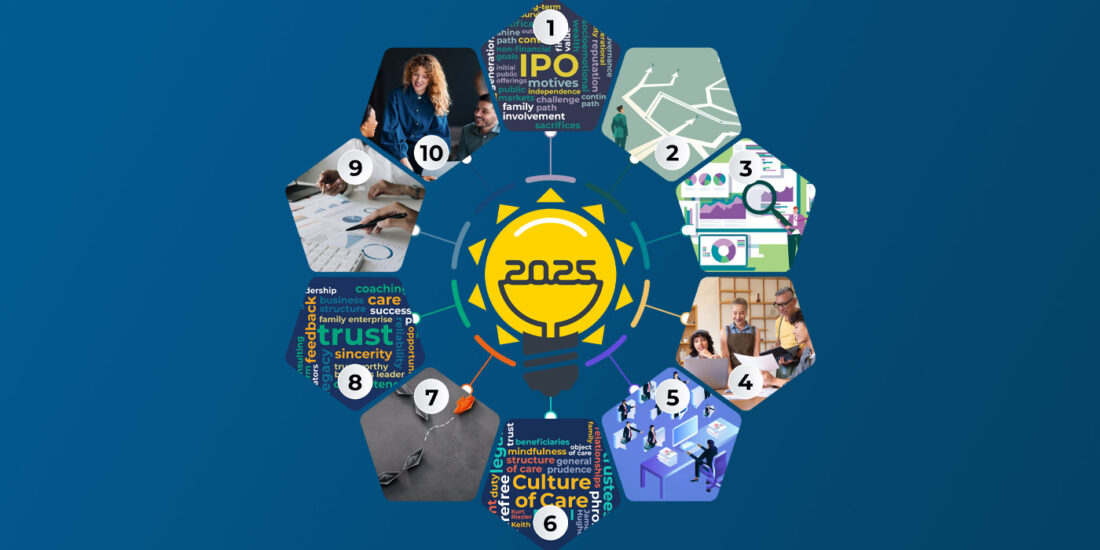Implications of Family Business Employment for Employees’ Innovative Work Involvement
(Authors: Yannick Bammens, Guy Notelaers, and Anita Van Gils)
Research Applied précis prepared by Kim Schneider-Malek, Family Enterprise Continuity Alliance
In this paper, the authors shed light on the likelihood that being employed in a family business is conducive to employees’ innovative work involvement. Additionally, it states that family business employers benefit because employees are valuable resources of knowledge, insight, and problem-solving creativity when they perceive organizational support and feel motivated to contribute new ideas and suggestions for improvement. This is also referred to as innovation.
The authors gain their insight based on a study they conducted in Belgium with a diverse group of 893 employees. They begin to explore the peculiar features exhibited by family businesses and largely overlooked in traditional models of innovation.
Implications for Family Business Leaders
The ways that family business leaders can unleash the innovation potential of their employees and create innovation-supportive work environments include such practices as:
- Establishing new-practice and cross-functional teams that huddle regularly (weekly or monthly) to cultivate cross-communication regarding work processes, systems thinking, and after-action review
- Establishing an employee-led innovation alliance that fosters greater engagement, advocates regularly for the power of inclusion, and promotes a culture of inquiry and feedback
- Conducting a values matrix exercise for both the business family and the family business so that the driving forces that inspire exploitative innovation remain known, strong, and supported
- Establishing a company-wide ritual that celebrates innovation, highlighting employee contribution to both positive outcomes and beneficial failures; this can be as simple as a pizza party or as advanced as an off-site retreat
- Investing in a personality insight initiative, using profiling instruments when and where appropriate, to learn how to inspire the type of risk-taking and voluntary engagement
Summary of the Research
In order to assess innovation in the family business context in this study, the authors divided innovation into two categories: explorative and exploitative.
- Explorative innovation is radical in nature and requires formalized methods, substantial resource investment, job criteria, and strict managerial supervision and coordination. This is less common in family businesses because of the inherent risk, common requirement of outside resources, and potential socioeconomic threat.
- Exploitative innovation, however, is incremental, thrives on informal methods, requires human, intellectual, social, and time capital but not necessarily extensive financial capital, is voluntary and part of an extra-role behavior, and is largely aimed at serving existing customer wants in more efficient and reliable ways. The authors found that most family businesses embrace this type of innovation because it is more aligned with their business values and is inherent in the way they control their businesses and manage their employees.
The authors propose that employees who work for family businesses demonstrate higher levels of spontaneous and natural engagement in informal innovation activity than employees in other organizational forms because of two reasons: 1) heightened perceived organizational support and, 2) work motivation.
Perceived organizational support reflects employees’ beliefs concerning the degree to which the organization cares about their well-being and generally values their contributions. When employees feel supported and cared for, they will contribute to innovations more easily and confidently.
Two characteristics of fostering a sense of perceived organizational support climate in family business are direct encouragement and indirect encouragement.
- Direct encouragement is characterized by top-down signals that inform and reassure employees that their innovative work involvement will be allowed for, welcomed, and paid attention to by the key influencers.
- Indirect encouragement is general in scope, broadly aimed at enhancing employees’ well-being and motivation, and taking the extra mile in treating their employees well.
More studies are needed to continue to improve our understanding of the advantages and disadvantages of family influence on innovation practices. Meanwhile, the authors of the study and article are shedding light on an important insight. For a good experiential perspective read the classic Harvard Business School case study on Fel-Pro (written by Carrie Meek and John L. Ward), a fifth-generation American-based family business that strongly demonstrated the relationship of family business employment with employees’ innovative work involvement throughout their family ownership.
About the contributor:
 Kim Schneider-Malek is founder and president of Family Enterprise Continuity Alliance. She is an FFI Fellow, a member of the GEN faculty and the recipient of the 2014 Barbara Hollander Award. Kim can be reached at kim@advancingfamilyenterprise.com.
Kim Schneider-Malek is founder and president of Family Enterprise Continuity Alliance. She is an FFI Fellow, a member of the GEN faculty and the recipient of the 2014 Barbara Hollander Award. Kim can be reached at kim@advancingfamilyenterprise.com.




